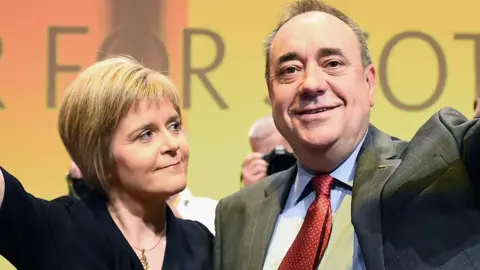In the latest revelations from the political landscape of Scotland, former First Minister Nicola Sturgeon has vehemently denied any allegations suggesting a conspiracy aimed at dismantling the career of her long-time mentor, Alex Salmond. In her memoir titled “Frankly,” Sturgeon conveys a complex narrative regarding her relationship with Salmond, nestled within a backdrop of serious accusations and political turmoil that have ensued over the last few years.
In the latest excerpt shared with the public through the Sunday Times, Sturgeon takes a critical stand against Salmond, accusing him of lacking contrition for the behavioral issues he faced regarding women. The shadow of Salmond’s past is significant; in 2020, he was acquitted of 13 sexual offense charges, including charges of attempted rape. However, his lawyer had conceded during the trial that he “could have been a better man,” contributing to the ongoing discourse on his pattern of behavior towards women.
Salmond, once a charismatic leader of the Scottish National Party (SNP) and the Alba Party founder, sadly passed away from a heart attack in North Macedonia last October at the age of 69. Sturgeon’s memoir does not shy away from revisiting the tumultuous events that characterized their relationship. She recounts her feelings upon learning about the allegations against him, describing a state of shock and emotional turmoil, highlighting that “the substance of the complaints, one in particular, shocked me. I felt sick.”
Sturgeon narrates an instance where Salmond initially appeared remorseful, admitting to certain allegations, labeling them as misunderstandings for which he offered an apology. However, it quickly became apparent that he wished for Sturgeon to intervene in the ongoing investigations, a demand that Sturgeon ultimately resisted. This conflict, according to Sturgeon, heralded the end of what had been a highly successful political partnership between them, deeply affecting her emotionally. Sturgeon reflects on this loss as akin to experiencing grief, revealing the depths of her connection with Salmond.
As the tension escalated, Sturgeon found herself embroiled in a significant political battle. She candidly writes, “I had to face the fact that he was determined to destroy me. I was now engaged in mortal political combat with someone I knew to be both ruthless and highly effective.” The weight of these accusations and the public scrutiny surrounding them only solidified Sturgeon’s resolve and highlighted the complicated nature of their relationship.
In recounting the flawed investigation process that had taken place, Sturgeon points to the judicial review in 2019, which determined the Scottish government’s handling of the allegations against Salmond was unlawful and biased. Subsequently, Salmond was awarded over £500,000 in costs, further complicating the narrative surrounding his public persona.
Additionally, Sturgeon argues against Salmond’s portrayal of himself as a victim, criticizing his tendency to manipulate sentiments that arose from genuine trauma. She contends that for there to be a conspiracy against him, numerous women would have had to collude without apparent motivations, alongside complicity from civil service, law enforcement, and the crown, which she deems absurd and unfounded.
The discussion of Salmond’s death underscores the lasting effects of their estrangement. Attending a conference in Ohrid, North Macedonia, posthumously mingles sorrow with unresolved feelings and past grievances. Reflecting on their complicated history, Sturgeon elucidates, “I know I will never quite escape the shadow he casts, even in death.”
As Sturgeon’s memoir gains traction, it reveals insights into both her political ascent and the intricate dynamics of her relationship with Salmond. Upcoming events surrounding the publication of “Frankly” encourage a wider conversation regarding the implications of their partnership, the complexities of personal relationships in high-stakes political arenas, and the legacy they both leave behind in Scotland’s political narrative. The excerpt shared follows a previous account where Sturgeon articulated her profound disbelief surrounding her own arrest amidst investigations into SNP finances, further illuminating the turbulent nature of her political journey. With the memoir set for release on August 14, the political community eagerly awaits further revelations.











